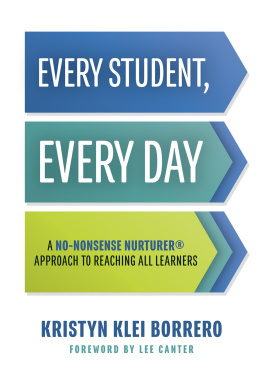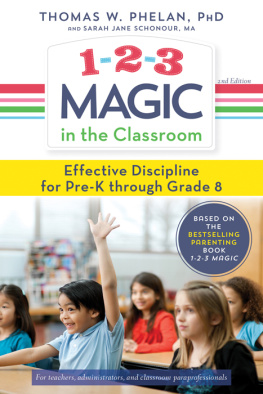LEE CANTERS
ASSERTIVE DISCIPLINE
Positive Behavior
Management for
Todays Classroom
NEW AND REVISED
TH EDITION

Copyright 2010 by Solution Tree Press
All rights reserved, including the right of reproduction of this book in whole or in part in any form.
555 North Morton Street
Bloomington, IN 47404
800.733.6786 (toll free) / 812.336.7700
FAX: 812.336.7790
email:
solution-tree.com
Printed in the United States of America
Library of Congress Cataloging-in-Publication Data
Canter, Lee.
Lee Canters assertive discipline : positive behavior management for todays classroom / Lee Canter. -- 4th ed.
p. cm.
Cover title: Lee Canters assertive discipline
Includes bibliographical references and index.
ISBN 978-1-934009-15-4 (perfect bound : alk. paper) -- ISBN 978-1-935249-23-8 (library binding : alk. paper) 1. School discipline. 2. Behavior modification. 3. Classroom management. I. Title. II. Title: Lee Canters assertive discipline.
LB3013.C33 2010
371.1024--dc22
2009034667
Solution Tree
Jeffrey C. Jones, CEO & President
Solution Tree Press
President: Douglas M. Rife
Publisher: Robert D. Clouse
Director of Production: Gretchen Knapp
Managing Production Editor: Caroline Wise
Senior Production Editor: Suzanne Kraszewski
Proofreader: Elisabeth Abrams
Text Designer: Amy Shock

Cover Designer: Pamela Rude
This book is dedicated to all the educators at Aspire Public Schools. Your commitment has inspired me to redouble my efforts to do all in my power to help to close the achievement gap in our nations schools.
Acknowledgments
This book would not exist if it were not for the vision and persuasive skills of Douglas Rife, president of Solution Tree Press. As well, I appreciate the efforts of Gretchen Knapp and the editorial staff at Solution Tree for helping make this book a reality.
In addition, to my wife, Barb, for all the time and effort she put in to editing the manuscriptyoure simply the best!
Finally, thank you to all the educators I have the privilege to work with each day who strive diligently to provide a high-quality education to our countrys youth.
Solution Tree gratefully acknowledges the contributions of the following reviewers:
Anne Gregory
Assistant Professor, Clinical and School Psychology
Curry School of Education, University of Virginia
Charlottesville, Virginia
Amanda Bozack
Assistant Professor
University of New Haven
West Haven, Connecticut
Dave Levin
Cofounder
KIPP Schools
New York, New York
Dennis Wiseman
Professor
Spadoni College of Education, Coastal Carolina University
Conway, South Carolina
Janet Robinson
Superintendent
Newton Connecticut Public Schools
Robert J. Marzano
CEO
Marzano Research Laboratory
Englewood, Colorado
Table of Contents
About the Author

Lee Canter is a world-renowned expert on classroom management. His acclaimed Assertive Discipline program has been the gold standard in the field since it was first published in 1976. Lee continues to develop cutting-edge coaching and training focused on establishing safe and orderly school environments that support closing achievement gaps. Known as one of the most dynamic speakers and trainers in education today, he has keynoted countless conferences and has been a frequent guest on noted television programs including The Oprah Winfrey Show, the TODAY Show, and Good Morning America.
Cofounder of Canter and Associates, Lee has written more than forty books and training programs for educators, including Assertive Discipline, Parents on Your Side, Succeeding With Difficult Students, The High-Performing Teacher, and Classroom Management for Academic Success. In addition, he is known for developing one of the most successful distance learning masters programs for educators. Lee and his staff have trained more than one million teachers worldwide in his Assertive Discipline programs.
Lee earned a bachelors degree in history from California State University, Northridge, and a masters degree in social work from the University of Southern California.
Introduction
It has been more than thirty years since the original Assertive Discipline was published in 1976. Since that time, over 1.5 million educators have used the concepts first presented in that book to help create positive learning environments for their students.
Throughout the years, I have continued to go into schools and classrooms and meet with educators using my program. With their feedback and the insights gained from that feedback, I have been able to clarify which strategies are the most effective and have adjusted the program to meet the changing needs of educators and students.
For many years, I have dedicated the vast majority of my efforts to working with beginning and struggling teachers, particularly in the most socioeconomically disadvantaged areas of this country. I see, day in and day out, the challenges these teachers face when attempting to deal with the behavior of difficult students, but often lacking the skills necessary to be successful.
Thus, in this edition, I place particular emphasis on addressing the needs of new and struggling teachers to give them the skills and confidence necessary to take charge of their classrooms in a firm, fair, and positive manner. In order to accomplish this goal, I introduce new concepts, including how teachers can earn the respect of todays students by developing what I call a strong teacher voice, and provide a step-by-step model for how teachers can teach students to manage their own behavior.
Also you will find included in this edition basic instructional strategies that are vital to help teachers reduce disruptive behavior. The reality is that the more effective the teachers instruction, the more students will stay engaged and not become disruptive.
I have also incorporated updated versions of concepts that were originally presented in my book Classroom Management for Academic Success (2006). These concepts include the Behavior Management Cycle, a fundamental strategy to teach students to follow directions, as well as a Responsible Behavior Curriculum, to guide efforts to teach students appropriate behavior at the beginning of the year. Concepts and strategies from the previous edition of Assertive Discipline (2001a) that educators and researchers have validated as being best practices in classroom management are included as well.
Finally, it has become abundantly clear to me that the first step in improving teachers classroom management skills is to give them the concepts and strategies they need to do their jobs. The reality is, though, that more steps are needed to ensure teachers have the necessary supports to maximize their ability to help students learn to behave responsibly in the classroom.
Next page










